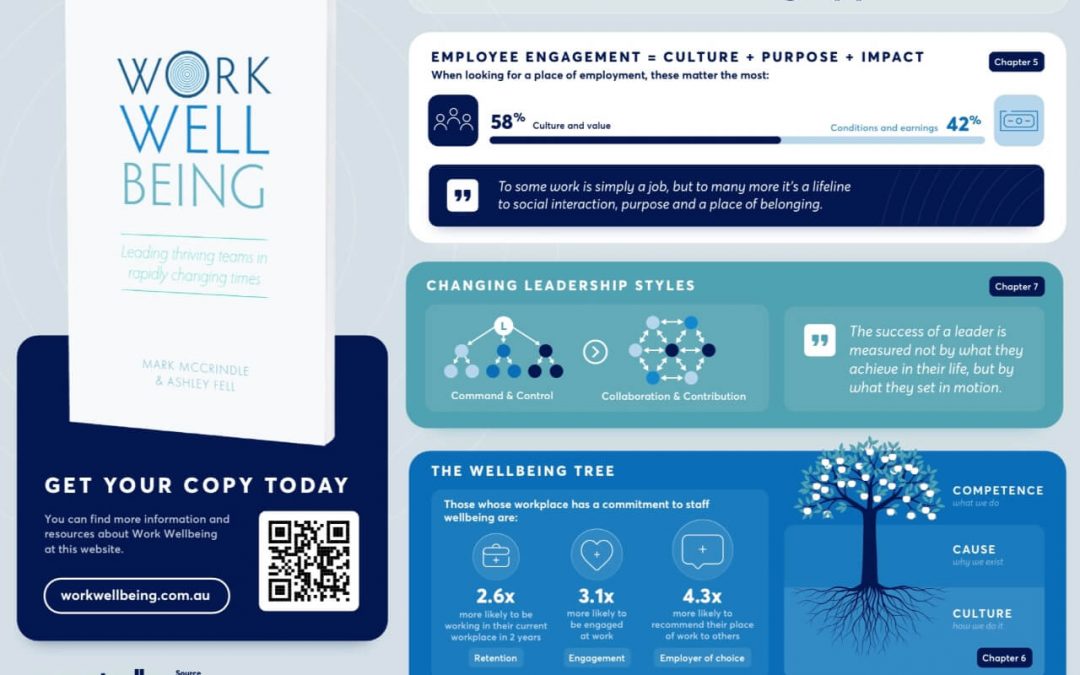
More Lessons on “Work Wellbeing”
Blogs and Stories

More lessons on “work wellbeing”
“Work Wellbeing: Leading thriving teams in rapidly changing times” is a book written by social researchers, Mark McCrindle and Ashley Fell and released in 2020.
In the book, they explore the findings from a series of surveys and other research that they undertook over the period 2017 – 2019 on the questions of what the state of work wellbeing is in Australia and what are ways to enhance work wellbeing.


As the above infographic shows, there are some very significant findings for employers:
- 83% of employed Australians say providing work wellbeing is very important and the responsibility of the employer
- 62% say mental health and stress of workers is the biggest factor impacting the future of work
- 72% say that work wellbeing is the most important element of a workplace
- Workplaces that have a commitment to worker wellbeing perform much better in staff retention (x2.6), employee engagement (x3.1) and worker recommendation of their employer (x4.3).
These findings are highly consistent with other wellbeing studies such as the National Workplace Wellbeing Surveys undertaken by AHRI in conjunction with the Wellbeing Lab and those undertaken by Superfriend.
This book features a wellbeing wheel which displays the authors’ concept of a wellbeing framework with 8 fields of wellbeing:
- Family relationships
- Financial security
- Vocational purpose
- Personal mental, emotional and spiritual health
- Social relationships
- Current financial earnings
- Vocational impacts and workload
- Physical health and fitness
This is just a slightly different way of looking at wellbeing and arguably complements other models such as PERMAH (Positive emotions – Engagement – Relationships – Meaning – Accomplishments – Health) or the Superfriend framework (Leadership – Connectedness – Policy – Capability – Culture).
Importantly the study recognises one very significant point which is that the average person spends 33% of more than half our years of life at work.
As a very wise shop steward said to me 40 years ago: “You spend a third of your life at work, Peter….. you had better bloody enjoy it!”
That is very true and obviously the better we can make the work experience for people, the greater the positive impact is going to be on the mental health of our broader community.
That is one of the reasons that we developed our Better Workplace suite of programs – because we know that businesses who invest in wellbeing can have a really positive impact on societal mental health….and we want to help businesses do that.
In conclusion, the book is worth a read and does provide some different ways of looking at work wellbeing and how to make it better.
We use tools like PERMAH and Appreciative Inquiry because they are tried and tested and universally recognised models and we know that they are simple to use and they work.
Having said that, it never hurts to look at the issues through someone else’s eyes.
CONTACT US
PosWork
A Division of Ridgeline Human Resources Pty Ltd
ABN : 24 091 644 094
info@poswork.com.au
6 Ellesmere Ave, Croydon Victoria 3136
1300 108 488
QUICK RESOURCE LINKS
COMMUNITY LINKS